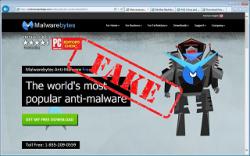Tech Scams Try to Impersonate Legit Security Companies
Posted by: Timothy Weaver on 05/13/2016 11:19 AM
[
 Comments
]
Comments
]
Malwarebytes has uncovered a fake Malwarebytes website that is trying to bilk victims.
 A group called Tech Kangaroos, a syndicate that appears to be making money by impersonating legitimate IT security companies, is luring unwitting customers and then charging exorbitant rates to do absolutely nothing.
A group called Tech Kangaroos, a syndicate that appears to be making money by impersonating legitimate IT security companies, is luring unwitting customers and then charging exorbitant rates to do absolutely nothing.
Malwarebytes discovered the fake site by using Google, just like any victim would. The website mimics the real site down to the boilerplate. However, it lists an 800 number to lure victims into the scheme.
Jérôme Segura, senior security researcher at Malwarebytes, said: “These scams are particularly effective because they have a 'phishing' element to them. People looking for the legitimate brands will inadvertently come across those fake sites and be lured into talking with tech support agents, who are essentially trained con artists."
He added, “Unfortunately it is not the first instance (nor will it be the last) of this kind of scam. However, we are actively going after crooks who leverage our brand and reputation to con innocent people.”
Malwarebytes is not the only victim to be clones. Others include Symantec/Norton, Kaspersky, ESET and others.
“These types of scams are a significant problem, as the individuals behind them need little more than a website and phone number to pull them off, tricking consumers into giving away banking information, passwords, or even money. Unfortunately, like most established, consumer-facing companies, we see these kinds of organizations try to profit off our name by impersonating our brand.”
In this typical tech scheme, Malwarebytes found that they take remote control of the computer, ‘fix' the problem and then charge them a hefty fee. Often the thieves charge $1000.
Source: SCMagazine
 A group called Tech Kangaroos, a syndicate that appears to be making money by impersonating legitimate IT security companies, is luring unwitting customers and then charging exorbitant rates to do absolutely nothing.
A group called Tech Kangaroos, a syndicate that appears to be making money by impersonating legitimate IT security companies, is luring unwitting customers and then charging exorbitant rates to do absolutely nothing.Malwarebytes discovered the fake site by using Google, just like any victim would. The website mimics the real site down to the boilerplate. However, it lists an 800 number to lure victims into the scheme.
Jérôme Segura, senior security researcher at Malwarebytes, said: “These scams are particularly effective because they have a 'phishing' element to them. People looking for the legitimate brands will inadvertently come across those fake sites and be lured into talking with tech support agents, who are essentially trained con artists."
He added, “Unfortunately it is not the first instance (nor will it be the last) of this kind of scam. However, we are actively going after crooks who leverage our brand and reputation to con innocent people.”
Malwarebytes is not the only victim to be clones. Others include Symantec/Norton, Kaspersky, ESET and others.
“These types of scams are a significant problem, as the individuals behind them need little more than a website and phone number to pull them off, tricking consumers into giving away banking information, passwords, or even money. Unfortunately, like most established, consumer-facing companies, we see these kinds of organizations try to profit off our name by impersonating our brand.”
In this typical tech scheme, Malwarebytes found that they take remote control of the computer, ‘fix' the problem and then charge them a hefty fee. Often the thieves charge $1000.
Source: SCMagazine
Comments






